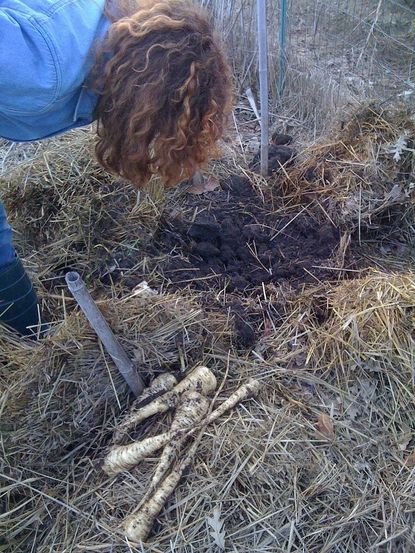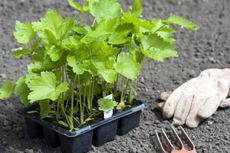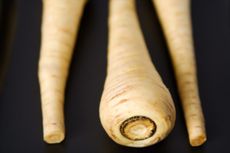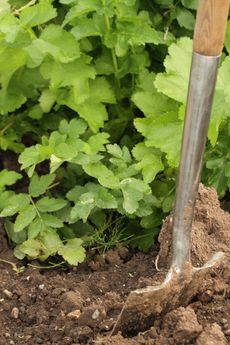Can You Overwinter Parsnips – Tips For Parsnip Winter Care


Parsnips are a cool season vegetable that actually becomes sweeter when exposed to several weeks of cool, frosty weather. That leads us to the question "can you overwinter parsnips?" If so, how do you grow parsnips in winter and what kind of parsnip winter care will this root crop require?
Can You Overwinter Parsnips?
Absolutely! Overwintering parsnips is a great idea. Just be sure when overwintering parsnips, that you mulch them heavily. When I say heavily, provide them with 6 to 12 inches (15-31 cm.) of straw or compost mulch. Once they are mulched as such, there is no further parsnip winter care required. The roots will store beautifully until you are ready to use them. If you live in an area that has mild or particularly rainy winters, it is better to dig up the roots in late fall and store them in a cellar or like area, preferably one with 98 to 100% humidity and between 32 and 34 degrees F. (0-1 C.). Likewise, you can keep them in the refrigerator for up to four weeks. For overwintered parsnips, remove the mulch from the beds in the spring and harvest the roots before the tops begin to sprout. Never let the plants flower before harvesting. If you do, the roots will become woody and pithy. Given that parsnips are biennials, if the seeds just sprouted this year, it is unlikely that they will flower unless stressed.
How to Grow Parsnips in Winter
Parsnips prefer sunny areas of the garden with fertile, deep, well-draining soil. Parsnips are nearly always grown from seed. To guarantee germination, always use a fresh pack of seeds since parsnips lose their viability rapidly after about a year. It’s also advisable to soak the seeds overnight to hasten germination. Plant parsnip seeds in the spring when soil temperatures are 55 to 65 degrees F. (13-18 C.). Incorporate plenty of organic matter into the soil and an all-purpose fertilizer. Keep the seedbed evenly moist and be patient; parsnips can take over two weeks to germinate. When the seedlings are about 6 inches (15 cm.) in height, thin them to 3 inches (8 cm.) apart. High summer temperatures reduce growth, decrease quality, and cause bitter roots. To protect the plants from higher temps, apply organic mulches such as grass clippings, leaves, straw, or newspapers. Mulches will cool the soil and reduce water stress, resulting in happier parsnips.
Gardening tips, videos, info and more delivered right to your inbox!
Sign up for the Gardening Know How newsletter today and receive a free download of our most popular eBook "How to Grow Delicious Tomatoes."

Amy Grant has been gardening for 30 years and writing for 15. A professional chef and caterer, Amy's area of expertise is culinary gardening.
-
 Grow a Bathroom Oasis: 8 Best Bathroom Plants With No Light or Low Light
Grow a Bathroom Oasis: 8 Best Bathroom Plants With No Light or Low LightSome apartment dwellers grow the best bathroom plants with no light or low light. Read how one of our favorite plant lovers does it in the big city.
By Teo Spengler
-
 "My Worst Mistake" – Gardeners Share 10 Hard-Learned Lessons
"My Worst Mistake" – Gardeners Share 10 Hard-Learned LessonsGardeners never stop learning, and sometimes our mistakes are the best teachers. But why not save time and heartache by learning from other gardeners' failures?
By Melanie Griffiths
-
Powdery Mildew Of Parsnips – Treating Signs Of Powdery Mildew In Parsnips
Powdery mildew is a very common disease that affects a wide array of plants. Powdery mildew of parsnips can be a problem if left unchecked too. To learn more about how to manage and recognize the symptoms of powdery mildew in parsnips, click here.
By Liz Baessler
-
 Parsnip Leaf Spot Problems – Learn About Leaf Spot On Parsnips
Parsnip Leaf Spot Problems – Learn About Leaf Spot On ParsnipsParsnips are as easy to grow as their cousin the carrot. Easy to grow they may be, but not without their share of diseases and pests. One such disease, parsnip leaf spot results in exactly what it sounds like - parsnips with spots on leaves. Learn more in this article.
By Amy Grant
-
 Guide To Parsnip Diseases – How To Treat Sick Parsnips In The Garden
Guide To Parsnip Diseases – How To Treat Sick Parsnips In The GardenParsnips are the often overlooked middle child of the root vegetable world, but they can be total rock stars in your garden. Just be on the lookout for these common parsnip diseases and your vegetable stand will be the envy of the neighborhood! Learn more here.
By Kristi Waterworth
-
 Harvesting Parsnips In Winter: How To Grow A Winter Parsnip Crop
Harvesting Parsnips In Winter: How To Grow A Winter Parsnip CropGardeners that have tried planting parsnip seeds in spring often get disappointing results. Parsnips have a reputation as being difficult to grow, mostly because gardeners plant them at the wrong time. An ideal time for many regions is winter. Learn more here.
By Darcy Larum
-
 Container Grown Parsnips – Learn How To Grow Parsnips In A Container
Container Grown Parsnips – Learn How To Grow Parsnips In A ContainerRoot vegetables are making a comeback, and parsnips are high on the list. Parsnips are grown for their delicious roots and generally do best planted in a garden, but what if you don't have a garden plot? Can you grow parsnips in pots? Find out here.
By Amy Grant
-
 Growing Parsnips From Kitchen Scraps – Can You Regrow Parsnips From Tops
Growing Parsnips From Kitchen Scraps – Can You Regrow Parsnips From TopsYou only have to buy a vegetable once, and after you can just regrow it from its base. In the case of some vegetables, like celery, this is actually true. But what about parsnips? Do parsnips regrow after you've eaten them? Find out in this article.
By Liz Baessler
-
 Seed Grown Parsnips: How To Grow Parsnips From Seed
Seed Grown Parsnips: How To Grow Parsnips From SeedIf you?re interested in seed-grown parsnips, give it a try! Growing parsnips from seed isn?t difficult as long as you provide the proper growing conditions. Learn how to grow parsnips from seed with the information found in this article.
By Mary H. Dyer
-
 Parsnip Soil Requirements – Tips For Parsnip Growing Conditions
Parsnip Soil Requirements – Tips For Parsnip Growing ConditionsA hardy root vegetable with a sweet, slightly nutty flavor, parsnips taste even better after the weather turns frosty in autumn. Parsnips aren't difficult to grow, but proper soil preparation makes all the difference. Learn about parsnip soil requirements in this article.
By Mary H. Dyer